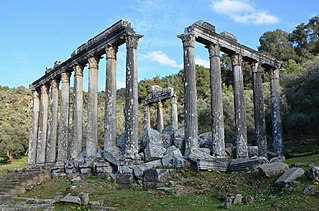Related Research Articles
In ordinary language, a crime is an unlawful act punishable by a state or other authority. The term crime does not, in modern criminal law, have any simple and universally accepted definition, though statutory definitions have been provided for certain purposes. The most popular view is that crime is a category created by law; in other words, something is a crime if declared as such by the relevant and applicable law. One proposed definition is that a crime or offence is an act harmful not only to some individual but also to a community, society, or the state. Such acts are forbidden and punishable by law.

Exile is primarily penal expulsion from one's native country, and secondarily expatriation or prolonged absence from one's homeland under either the compulsion of circumstance or the rigors of some high purpose. Usually persons and peoples suffer exile, but sometimes social entities like institutions are forced from their homeland.

Roman law is the legal system of ancient Rome, including the legal developments spanning over a thousand years of jurisprudence, from the Twelve Tables, to the Corpus Juris Civilis ordered by Eastern Roman emperor Justinian I. Roman law forms the basic framework for civil law, the most widely used legal system today, and the terms are sometimes used synonymously. The historical importance of Roman law is reflected by the continued use of Latin legal terminology in many legal systems influenced by it, including common law.

Praetor, also pretor, was the title granted by the government of Ancient Rome to a man acting in one of two official capacities: (i) the commander of an army, and (ii) as an elected magistratus (magistrate), assigned to discharge various duties. The functions of the magistracy, the praetura (praetorship), are described by the adjective: the praetoria potestas, the praetorium imperium, and the praetorium ius, the legal precedents established by the praetores (praetors). Praetorium, as a substantive, denoted the location from which the praetor exercised his authority, either the headquarters of his castra, the courthouse (tribunal) of his judiciary, or the city hall of his provincial governorship.

Ancient Greece was a northeastern Mediterranean civilization, existing from the Greek Dark Ages of the 12th–9th centuries BC to the end of classical antiquity, that comprised a loose collection of culturally and linguistically related city-states and other territories—unified only once, for 13 years, under Alexander the Great's empire. In Western history, the era of classical antiquity was immediately followed by the Early Middle Ages and the Byzantine period.

Demetrius I, surnamed Soter, reigned as king (basileus) of the Hellenistic Seleucid Empire from November 162 – June 150 BC. Demetrius grew up in Rome as a hostage, but returned to Greek Syria and overthrew his young cousin Antiochus V Eupator and regent Lysias. Demetrius took control during a turbulent time of the Empire, and spent much of his time fighting off revolts and challenges to his power from threats such as Timarchus and Alexander Balas.

Polis, plural poleis, literally means "city" in Greek. In Ancient Greece, it originally referred to an administrative and religious city center, as distinct from the rest of the city. Later, it also came to mean the body of citizens under a city's jurisdiction. In modern historiography, the term is normally used to refer to the ancient Greek city-states, such as Classical Athens and its contemporaries, and thus is often translated as "city-state". The poleis were not like other primordial ancient city-states like Tyre or Sidon, which were ruled by a king or a small oligarchy; rather, they were political entities ruled by their bodies of citizens.

A hostage is a person seized by an abductor in order to compel another party such as a relative, employer, law enforcement or government to act, or refrain from acting, in a certain way, often under threat of serious physical harm or death to the hostage(s) after expiration of an ultimatum. The Encyclopædia Britannica Eleventh Edition (1910-1911) defines a hostage as "a person who is handed over by one of two belligerent parties to the other or seized as security for the carrying out of an agreement, or as a preventive measure against certain acts of war." Hostage taking is now considered a criminal activity.
Archon is a Greek word that means "ruler", frequently used as the title of a specific public office. It is the masculine present participle of the verb stem αρχ-, meaning "to be first, to rule", derived from the same root as words such as monarch and hierarchy.

The vigintisexviri were a college (collegium) of minor magistrates in the Roman Republic. The college consisted of six boards:

Colonies in antiquity were post-Iron Age city-states founded from a mother-city, not from a territory-at-large. Bonds between a colony and its metropolis remained often close, and took specific forms during the period of classical antiquity. Generally, colonies founded by the ancient Phoenicians, Carthage, Rome, Alexander the Great and his successors remained tied to their metropolis, but Greek colonies of the Archaic and Classical eras were sovereign and self-governing from their inception. While Greek colonies were often founded to solve social unrest in the mother-city, by expelling a part of the population, Hellenistic, Roman, Carthaginian, and Han Chinese colonies were used for trade, expansion and empire-building.
An ala was the term used during the middle of the Roman Republic to denote a military formation composed of conscripts from the socii, Rome's Italian military allies. A normal consular army during the period consisted of two legions, composed of only Roman citizens, and two allied alae.

The duumviri, originally duoviri and also known in English as the duumvirs, were any of various joint magistrates of ancient Rome. Such pairs of magistrates were appointed at various periods of Roman history both in Rome itself and in the colonies and municipia.

Euromus or Euromos – also, Europus or Europos (Εὐρωπός), Eunomus or Eunomos (Εὔνωμος), Philippi or Philippoi (Φίλιπποι); earlier Kyromus and Hyromus – was an ancient city in Caria, Anatolia; the ruins are approximately 4 km southeast of Selimiye and 12 km northwest of Milas, Muğla Province, Turkey. It was situated at the foot of Mount Grium, which runs parallel to Mount Latmus, and was built by one Euromus, a son of Idris, a Carian.
In ancient Roman international law, a clarigation was a loud, clear call or summons made to an enemy to demand satisfaction for some injury received, without which there would be a declaration of war. Clarigation equates to what the Ancient Greeks called ανδροληψία (androlepsy).

The Greco-Roman world, as understood by modern scholars and writers, includes the geographical regions and countries that culturally—and so historically—were directly and intimately influenced by the language, culture, government and religion of the Greeks and Romans. A better-known term is classical civilization. In exact terms the area refers to the "Mediterranean world", the extensive tracts of land centered on the Mediterranean and Black Sea Basins, the "swimming pool and spa" of the Greeks and the Romans, in which those peoples' cultural perceptions, ideas, and sensitivities became dominant in classical antiquity.

The Cleomenean War was fought between Sparta and the Achaean League for the control of the Peloponnese. Under the leadership of king Cleomenes III, Sparta initially had the upper hand, which forced the Achaean League to call for help the Macedonian king Antigonos Doson, who decisively defeated Cleomenes in the battle of Sellasia in 222.

Clothing in ancient Greece primarily consisted of the chiton, peplos, himation, and chlamys. Ancient Greek civilians typically wore two pieces of clothing draped about the body: an undergarment and a cloak.
The gens Castricia was a minor plebeian family during the later Republic and under the early Empire. No members of this gens held any important magistracy.
A contubernium was a quasi-marital relationship between a free citizen and a slave or between two slaves in ancient Rome. A slave involved in such relationship was called contubernalis.
References
 This article incorporates text from a publication now in the public domain : Chambers, Ephraim, ed. (1728). "Androlepsy". Cyclopædia, or an Universal Dictionary of Arts and Sciences (1st ed.). James and John Knapton, et al.
This article incorporates text from a publication now in the public domain : Chambers, Ephraim, ed. (1728). "Androlepsy". Cyclopædia, or an Universal Dictionary of Arts and Sciences (1st ed.). James and John Knapton, et al.- William Smith, "Androlepsia" from A Dictionary of Greek and Roman Antiquities, John Murray: London, 1875.